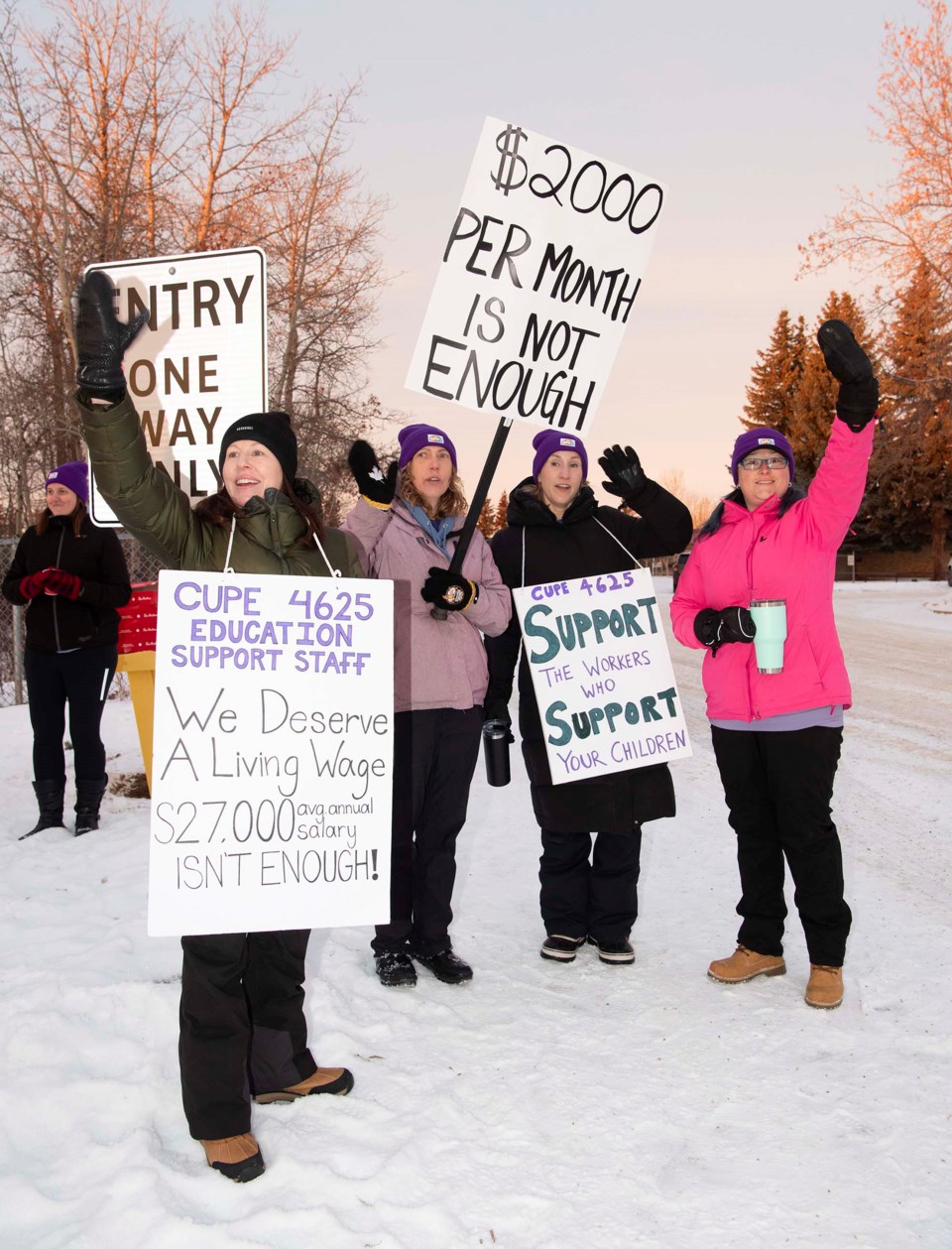There were plenty of cheers and honks of support Monday morning at Sturgeon Heights as the first day of a division-wide strike by school support workers got underway.
Some 225 Sturgeon Public educational assistants and other support workers with CUPE Local 4625 went on strike as of 7:30 a.m. Jan. 13. The workers were set to demonstrate from 7:30 a.m. to 9 a.m. at all Sturgeon Public schools until further notice.
Union members voted 94 per cent of strike action last Oct. 25, which put them in a position to go on strike with 72 hours of notice. They gave such notice on Jan. 10.
CUPE Local 4625 president Kelly Salisbury said workers held off on the strike until now in hopes their demands would be met, but that hasn’t happened.
“We don’t want to make anything difficult or unpleasant for anybody, especially students,” she said in a Jan. 10 interview.
“We’re just trying to get our point across that we need more funding in the schools.”
As the sun crept over the horizon Monday, Local 4625 members were cheering, waving signs, and dancing to Gloria Gaynor’s “I Will Survive” outside of Sturgeon Heights School in St. Albert. Passing drivers honked horns in support, with one shouting, “We love our support workers!” through an open car window.
One woman at the Sturgeon Heights picket line (whom the Gazette has granted anonymity to protect her family) said she was a single mother who earned about $2,000 a month as an educational assistant. She had not had a raise in her 14 years, and relied on side gigs and credit cards to pay her bills.
“I would like to be able to come to work and have the peace of mind knowing I can go home and pay my bills at the end of the month,” she said.
Salisbury said the local’s main demand was for the province to increase school funding so support workers could get a living wage. The average wage amongst members was $34,000 a year. Many had gone 10 years without a raise despite about 30 per cent inflation in the last decade, and were working two or three jobs to make ends meet. The low pay also contributed to high turnover and staff shortages, both of which affected students.
“It’s just not sustainable anymore,” she said.
Many strikes
About 3,000 Edmonton Public educational support staff also went on strike on Monday, joining about a thousand Fort McMurray education support workers who had been on strike since November. Salisbury predicted more strikes in other school districts unless the province addressed this funding issue.
In a letter to parents sent Jan. 9 by Sturgeon Public superintendent Shawna Warren, Sturgeon Public officials said their schools would remain open during the strike. As of Jan. 13, morning pre-K programs would be pushed back to 9:15 a.m. and would not have busing available until further notice. The strike may also affect extracurricular and joint-use activities. Some students with complex needs may be asked to stay home if supports were unavailable. Parents should set aside more time to pick up and drop off students due to potential delays from picketing.
In a Jan. 10 media release, Sturgeon Public spokesperson Lauren Walter said the district valued the vital contributions of its support staff and was committed to continued negotiations, having been in talks with the union on a deal since 2021.
“While we respect the union’s right to strike, we are deeply disappointed by the impact this action will have on our students and classrooms.”
Stephanie Cordova, who sits on the Sturgeon Heights school council, said she felt frustrated on behalf of union workers as she drove past them on Monday.
“They shouldn’t have to beg for a living wage.”
Cordova said she recently met an educational assistant who had to work two side jobs, one as a cashier at a Michaels store, because of the low pay she earned at Sturgeon Heights.
“Why are there still people, especially in our education system, earning a poverty wage?” she asked, outraged.
“That is un-freaking called for, especially when they’re working with our kids.”
Cordova called on Sturgeon Public and the province to invest in education, calling it an investment in the future.
“If we’re not going to invest in our children, who will?”




